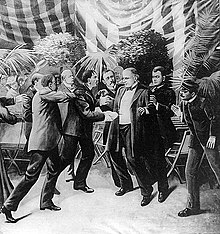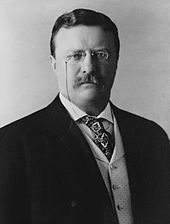1901 in the United States
| |||||
| Decades: |
| ||||
|---|---|---|---|---|---|
| See also: | |||||
This article needs additional citations for verification. (August 2021) |
Events from the year 1901 in the United States.
Incumbents[]
Federal Government[]
- President: William McKinley (R-Ohio) (until September 14), Theodore Roosevelt (R-New York) (starting September 14)
- Vice President:
- until March 4: vacant
- March 4–September 14: Theodore Roosevelt (R-New York)
- starting September 14: vacant
- Chief Justice: Melville Fuller (Illinois)
- Speaker of the House of Representatives: David B. Henderson (R-Iowa)
- Congress: 56th (until March 4), 57th (starting March 4)
| Governors and Lieutenant Governors |
|---|
Governors[]
Lieutenant Governors[]
|
Events[]

January 10: Oil in Texas.

March 4: Theodore Roosevelt becomes the 25th U.S. Vice President
January–March[]
- January 1 – Pentecostalism is born, at a prayer meeting at Bethel Bible College in Topeka, Kansas.
- January 3 – Census Commissioner predicts a US population of at least 300 million by 2001
- January 5 – Typhoid fever breaks out in a Seattle jail, the first of two typhoid outbreaks in the United States during the year.
- January 7 – Alferd Packer is released from prison in the United States after serving 18 years for cannibalism.
- January 10 – In the first great Texas gusher, oil is discovered at Spindletop in Beaumont, Texas.
- January 22 – The Grand Opera House in Cincinnati, Ohio, is destroyed in a fire.
- January 28 – Baseball's American League declares itself a Major League.
- February 4 – Puccini's Tosca makes its U.S. debut at the Metropolitan Opera in New York.[1]
- February 20 – The Hawaii Territory Legislature convenes for the first time.
- February 25 – U.S. Steel, the first billion-dollar corporation and at some time the world's largest producer of steel, is incorporated by industrialist J. P. Morgan.
- March 2
- The U.S. Congress passes the Platt Amendment, limiting the autonomy of Cuba as a condition for the withdrawal of American troops.
- The Carnegie Steel Company with the Illinois Steel Company & The National Steel Company merged to form the United States Steel Corporation.
- March 4 – President William McKinley begins his second term. Theodore Roosevelt sworn in as Vice President of the United States.
April–June[]

May 3: The Great Fire of 1901 in Jacksonville begins.
- April 25 – New York State becomes the first to require automobile license plates.
- May – Monte Ne health resort opens in the Ozarks.
- May 3 – The Great Fire of 1901 in Jacksonville, Florida, begins.
- May 17 – The U.S. stock market crashes for the first time.
- May 27 – The Edison Storage Battery Company is founded in New Jersey.
- May 28 – Cherry v. Des Moines Leader is decided in the Iowa Supreme Court, upholding the right to publish critical reviews.
- June 12 – Cuba becomes a U.S. protectorate.
July–September[]

September 6: President McKinley is shot.

September 14: "Teddy" Roosevelt succeeds McKinley as the 26th U.S. President.
- June 22 to July 31 – The worst heat wave in U.S. history until the 1930s, affecting most areas east of the 100th meridian, is estimated to have killed over 9,500 people.
- July 24 – O. Henry is released from prison in Columbus, Ohio after serving 3 years for embezzlement from the First National Bank in Austin, Texas.
- August 10 – U.S. Steel recognition strike of 1901: Members of the Amalgamated Association of Iron, Steel, and Tin Workers begin a strike against United States Steel Corporation after failing to reach a settlement of their demands, and 14,000 employees walk off of the job.[2][3]
- September 2 – Vice President Theodore Roosevelt utters the famous phrase, "Speak softly and carry a big stick" at the Minnesota State Fair.
- September 5 – The National Association of Professional Baseball Leagues (later renamed Minor League Baseball) is formed in Chicago.
- September 6 – American anarchist Leon Czolgosz shoots President William McKinley at the Pan-American Exposition in Buffalo, New York. McKinley dies 8 days later.
- September 7 – The Boxer Protocol is signed between the Qing Empire of China and the Eight-Nation Alliance.
- September 14 – Vice President Theodore Roosevelt becomes the 26th President of the United States, upon the death of President William McKinley.
- September 26 – The body of President Abraham Lincoln is exhumed and reinterred in concrete several feet thick.
October–December[]
- October 4 – The American yacht Columbia defeats the Irish Shamrock in the America's Cup yachting race.
- October 16 – President Theodore Roosevelt invites African American leader Booker T. Washington to the White House. The American South reacts angrily to the visit, and racial violence increases in the region.
- October 23 – Yale University celebrates its bicentennial.
- October 24 – Michigan schoolteacher Annie Taylor goes down Niagara Falls in a barrel and survives.
- October 29 – In Amherst, New Hampshire, nurse Jane Toppan is arrested for murdering the Davis family of Boston with an overdose of morphine.
- October 29 – Leon Czolgosz, the assassin of William McKinley, is executed by electrocution.
- November 1 – Sigma Phi Epsilon is founded in Richmond, Virginia.
- November 15 – The Alpha Sigma Alpha fraternity is founded at Longwood University.
- November 28 – The new state constitution of Alabama requires voters to have passed literacy tests.
- December 3 – President Theodore Roosevelt delivers a 20,000-word speech to the House of Representatives asking Congress to curb the power of trusts "within reasonable limits."
Undated[]
- The Intercollegiate Prohibition Association is established in Chicago.
- Force (cereal) first produced.
Ongoing[]
- Progressive Era (1890s–1920s)
- Lochner era (c. 1897–c. 1937)
- Philippine–American War (1899–1902)
Births[]
- January 2 – Bob Marshall, wilderness activist, founder of The Wilderness Society (died 1939)
- January 3 – Henrietta Bingham, journalist, newspaper executive, horse-breeder and anglophile (died 1968)
- January 4 – Raoul Berger, Ukrainian-born attorney and law professor (died 2000)
- January 9 – Chic Young, cartoonist (died 1973)
- February 1
- February 8 – Virginius Dabney, teacher, journalist, writer and editor (died 1995)
- February 9 – Brian Donlevy, actor (died 1972)
- March 24 – Ub Iwerks, animator, cartoonist, character designer, inventor and special effects technician (died 1971)
- May 8 – Turkey Stearnes, baseball player (died 1979)[5]
- July 3 – Ruth Crawford Seeger, modernist composer and folk music arranger (died 1953)
- July 14 – George Tobias, actor (died 1980)
- July 22 – Pancho Barnes, pioneer aviator (died 1975)
- July 30 – John A. Carroll, U.S. Senator from Colorado from 1957 to 1963 (died 1983)
- August 3 – John C. Stennis, U.S. Senator from Mississippi from 1947 to 1989 (died 1995)
- August 4 – Louis Armstrong, jazz trumpeter (died 1971)
- August 8 – Ernest Lawrence, nuclear physicist, winner of the Nobel Prize in Physics in 1939 (died 1958)
- August 23 – John Sherman Cooper, U.S. Senator from Kentucky 1946-1949, 1952-1955 and 1956-1973 (died 1991)
- September 28 – Ed Sullivan, entertainment writer and television host (died 1974)
- December 5 – Walt Disney, animator, producer, director, screenwriter, voice actor and business magnate (died 1966)[6]
- December 12 – Fred Barker, criminal member of the Barker-Karpis gang, son of Ma Barker (killed 1935)
- December 16 – Margaret Mead, cultural anthropologist and author (died 1978)[7]
Deaths[]
- January 6 – James W. Bradbury, United States Senator from Maine from 1847 till 1853. (born 1802)
- January 16
- Murray Hall, born Mary Anderson, bail bondsman and politician (born 1841 in Scotland)
- Hiram Rhodes Revels, first African American senator (born 1827)
- January 21 – Elisha Gray, inventor and co-founder of Western Electric Manufacturing Company (born 1835)
- January 29 – Alexander H. Jones, Congressional Representative from North Carolina. (born 1822)
- March 13 – Benjamin Harrison, 23rd President of the United States from 1889 till 1893 and United States Senator from Indiana from 1881 to 1887. (born 1833)
- April 19 – Alfred Horatio Belo, newswriter and businessman, founder of The Dallas Morning News (born 1839)
- June 2 – James A. Herne, playwright and actor (born 1839)
- July 4 –
- John Fiske, historian and philosopher (born 1842)
- Julian Scott, artist and Civil War Medal of Honor recipient (born 1846)
- July 30 – Herbert Baxter Adams, educator and historian (born 1850)
- August 4 – Harriet Pritchard Arnold, author (born 1858)
- September 14 – William McKinley, 25th President of the United States from 1897 till 1901. (born 1843)
- October 10 – Lorenzo Snow, 5th President of The Church of Jesus Christ of Latter-day Saints (born 1814)
- October 21 – James A. Walker, Confederate general and US Congressman (born 1832)
- October 29 – Leon Czolgosz, Assassin of President William McKinley (born 1873)
- November 8 – Mary Ann Bickerdyke, nurse and hospital administrator for Union soldiers (born 1817)
- November 26 – John Denny, buffalo soldier and Medal of Honor recipient (born 1846)
- November 27 – Clement Studebaker, automobile manufacturer (born 1831)
See also[]
- List of American films of 1901
- Timeline of United States history (1900–1929)
References[]
- ^ Legrand, Jacques (1987). Chronicle of the 20th Century. Ecam Publication. p. 24. ISBN 0-942191-01-3.
- ^ "Order out for All to Strike". Chicago Daily Tribune. 1901-08-07. p. 1.
- ^ "Strike Order Is in Full Effect". Chicago Sunday Tribune. 1901-08-11. p. 1.
- ^ Views & Reviews. Views & Rewiews Productions. 1971. p. 4.
- ^ Johnson, Beatrice (7 October 2020). "Norman Thomas "Turkey" Stearnes (1901-1979) •". blackpast.org. Retrieved 14 December 2021.
- ^ Ryan, James Gilbert; Schlup, Leonard C. (26 March 2015). Historical Dictionary of the 1940s. Routledge. p. 107. ISBN 978-1-317-46865-3.
- ^ "Margaret Mead | Biography, Theory, Books, & Facts". Encyclopedia Britannica. Retrieved 16 February 2020.
Further reading[]
- "Domestic Chronology", Statistician and Economist, San Francisco: Louis P. McCarty, 1905, pp. 227–347 – via HathiTrust. (Covers events May 1898-June 1905)
External links[]
 Media related to 1901 in the United States at Wikimedia Commons
Media related to 1901 in the United States at Wikimedia Commons
Categories:
- 1901 in the United States